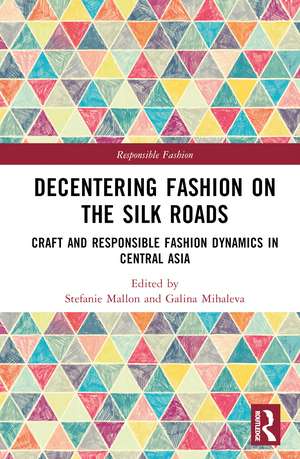Decentering Fashion on the Silk Roads: Craft and Responsible Fashion Dynamics in Central Asia: Responsible Fashion
Editat de Stefanie Mallon, Galina Mihalevaen Limba Engleză Hardback – 30 dec 2024
The book opens by exploring the importance of the old ‘Silk Roads' crossing through the heart of the world in Central Asia, serving not only as trade routes but also allowing knowledge, art and practices to be transmitted between the Orient and the Occident – enabling ideas to flourish and cultural dispositions to develop from Antiquity until Modernity. The unique set of chapters that follow examine and highlight the growing opportunities and lessons this region has to offer to Western fashion through local artistry and craft, and points toward the urgent need to slow down and adopt responsible principles and practices. The book constitutes a warm appreciation of the experiences and grateful thanks to the many communities from all different background and ages who contributed.
This rich travelogue is a refreshing resource for international scholars and postgraduate students studying and researching fashion theory and management in particular. It will also be of interest to anthropologists, cultural studies and textiles scholars.
Preț: 1001.55 lei
Preț vechi: 1221.40 lei
-18% Nou
Puncte Express: 1502
Preț estimativ în valută:
191.67€ • 198.01$ • 159.52£
191.67€ • 198.01$ • 159.52£
Carte tipărită la comandă
Livrare economică 25 martie-08 aprilie
Preluare comenzi: 021 569.72.76
Specificații
ISBN-13: 9781032831602
ISBN-10: 103283160X
Pagini: 210
Ilustrații: 60
Dimensiuni: 156 x 234 mm
Greutate: 0.49 kg
Ediția:1
Editura: Taylor & Francis
Colecția Routledge
Seria Responsible Fashion
Locul publicării:Oxford, United Kingdom
ISBN-10: 103283160X
Pagini: 210
Ilustrații: 60
Dimensiuni: 156 x 234 mm
Greutate: 0.49 kg
Ediția:1
Editura: Taylor & Francis
Colecția Routledge
Seria Responsible Fashion
Locul publicării:Oxford, United Kingdom
Public țintă
PostgraduateCuprins
Introduction I. Decentering fashion 1. The Impact on fashion of the World’s centre of gravity shift. Trade, identity and religion in emerging territories 2. Responsible Fashion in Central Asia 3. Cultural Identity and Memory in Clothing Design in Kazakhstan 4. The contemporizing of Uzbek traditional textiles through collaboration and entrepreneurship II. Crafting decentred and responsible fashion 5. (Re)Felting the future: From ancient craftsmanship to contemporary fashion design 6. Social Enterprises support Textile Artisans and Designers in Afghanistan 7. Discourses of craftsmanship in fashion media. On (in)visibility and (dis)empowerment within the fashion system 8. An Embroidery diary 9. Building Inclusive Culture through Tradition, Craft and Emerging Technologies III. Collaborating and diversifying to decentre fashion 10. The power of diversity: The interaction between craftspeople and designers as a resource for a diverse fashion system 11. Courtyard as Classrooms: Empowering Learners through Design Research in Rural India 12. Fashion and disability. From diversity to equality? Analyzing practices in the fashion industry
Notă biografică
Stefanie Mallon is cultural anthropologist and textile scientist at the University of Göttingen, Germany, with a research focus on Materiality and Sustainability in Fashion and Textiles. Recent publications include Digital fashion and the ‘future of fashion’ which analyses the users’ garment experience, Performative aging in swim wear and an empirical study on Fungus as an Alternative for Leather. Further works are the co-edited anthology Death and the Thing with studies about the meaning and functionality of textiles in the context of ‘death’, and an article titled ‘Thinking through fashion – Thinking fashion through’, which reflects on students’ perspectives on the future of fashion.
Galina Mihaleva is artist, fashion and wearable technology designer. Mihaleva's artistic practice and academic research deals primarily with the dialogue between body and dress, driven by the idea of having both a physical and a psychological relationship with a garment as responsive clothing.
Galina Mihaleva is artist, fashion and wearable technology designer. Mihaleva's artistic practice and academic research deals primarily with the dialogue between body and dress, driven by the idea of having both a physical and a psychological relationship with a garment as responsive clothing.
Descriere
Decentering Fashion on the Silk Roads focuses on the dynamism of fashion, textile craft, heritage and sustainability in Central Asia and beyond. This rich travelogue is a refreshing resource for international scholars and postgraduate students studying and researching fashion theory and management in particular.



